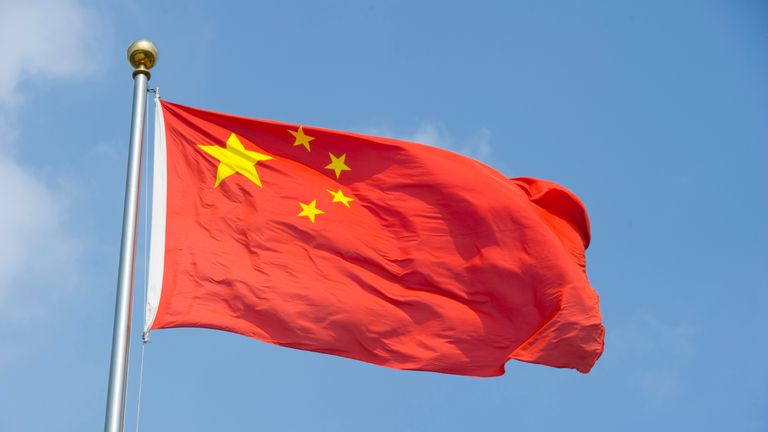Restrictions on foreign takeovers risk post-Brexit China backlash
Sky's Ian King says tightening takeover rules to repel Chinese raiders risks reprisals for the firms ministers want to protect.
Monday 8 June 2020 19:21, UK
The list reads like a Who's Who of well-known British brands and businesses: Tetley tea, Jaguar Land Rover (JLR), Boots, HP sauce, Harrods, Cadbury, Heathrow Airport, O2, Manchester United, Weetabix, Rolls-Royce Motors, Dulux paint and Beefeater gin.
All are businesses that have been bought by owners from outside the United Kingdom during the last couple of decades or so.
During that period, there has been much gnashing of teeth by those who deplored the loss of what they saw as national assets, despite plenty of evidence that businesses like JLR - owned by Tata of India - have actually flourished under foreign ownership.
Now, though, Britain's rules on foreign takeovers look set to be toughened up.
According to a report in The Times, Boris Johnson hopes to make it mandatory for British companies to report attempted takeovers that could give rise to 'security risks'.
Failing to adhere to the rules would be a criminal offence and could lead to the jailing or disqualification of directors and heavy fines.
The proposals revive those made by Theresa May's government two years ago for a more interventionist approach to takeovers, in a national security and investment white paper, which appeared to target Chinese companies in particular.
Mrs May was very keen on the proposals, but they ran into opposition from her senior cabinet colleagues, including the then chancellor Philip Hammond, and Greg Clark, then the business secretary.
They argued the proposals were contrary to the May government's message, at the time, that the UK would be an open economy and welcoming to overseas businesses and investors in the aftermath of Brexit.
This time around, the chancellor, Rishi Sunak, appears to be pushing for the rules supported by Dominic Cummings, the PM's chief adviser.
And they look more likely now to make it onto the statute book. That is not only because Mr Johnson enjoys a substantially bigger parliamentary majority than Mrs May.
It is also because the mood in parliament has shifted significantly against China. It was only five years ago that David Cameron was welcoming Chinese President Xi Jinping to Chequers and his chancellor, George Osborne, was promising to make the UK the world's most attractive destination for Chinese investment.
Since then, Tory MPs have become more suspicious about the role of Chinese company Huawei's involvement in 5G roll-out following attacks on the company by President Trump, while there was also unease over recent events at Imagination Technologies, a UK chip maker, which was bought for £550m three years ago by Canyon Bridge, a private equity firm backed by the Chinese state.
The latter was recently forced to back down over plans to replace Imagination's British directors with board members close to Beijing.
Amplifying those concerns has been unhappiness at Beijing's security crackdown in Hong Kong and China's initial handling of the COVID-19 pandemic.
Much of this has been fanned by the increasingly influential China Research Group of Conservative MPs, co-led by Tom Tugendhat, chairman of the Commons foreign affairs select committee.
He wrote in the Financial Times last month: "We cannot delay. Chancellor Rishi Sunak warns of a 'recession the likes of which we have not seen', which will see some businesses go under and others put up for sale [in the wake of the pandemic].
"An inferno of fire sales [of British companies] is riAG百家乐在线官网: if we are not careful, much of the intellectual property the UK needs for long-term innovation and prosperity could disappear to Shanghai or Shenzhen."
He called for Britain to set up a body like the Committee on Foreign Investment in the United States (CFIUS) which, under President Trump, has taken a more strident approach in arbitrating on foreign takeovers of US businesses.
Nor is the US government the only administration toughening up its approach to possible Chinese takeovers.
The European Commission is currently working on proposals to step up scrutiny of state-owned and supported companies operating in Europe or seeking to enter the EU's single market. It is being seen as a measure specifically targeted at Beijing and reflects unhappiness in Germany, in particular, that it is easier for Chinese companies to do business in Europe than it is for European companies to do business in China.
Australia is also in the process of introducing a tough new 'national security' test for foreign takeovers of its businesses.
Yet there are plenty of risks inherent in the government's proposals.
The first is the argument set out by Messrs Hammond and Clark two years ago: Brexit was supposed to be all about forging new trading relationships and pursuing openness in trade around the world.
Imposing hurdles to foreign takeovers runs counter to that and particularly when China is already a key partner in the construction of Hinkley Point 'C' in Somerset, the UK's first new nuclear power plant in a generation, as well as a putative investor in another new nuclear plant, Sizewell 'C', in Suffolk.
A second is that targeting Chinese investors in Britain risks reciprocal action against British companies in China. Some of the UK's largest companies, including the spirits maker Diageo, the consumer goods giant Unilever and the drugs major AstraZeneca, depend on China for a growing proportion of their sales.
The fortunes of others, such as HSBC, Standard Chartered and Prudential, depend to a very significant degree on Hong Kong and China.
They are already feeling twitchy following reports that Mr Johnson is planning to row back on previous commitments to Huawei, and the Sunday Telegraph reported at the weekend that Mark Tucker, HSBC's chairman, has warned the PM's advisers that the bank could face reprisals were Huawei to be barred from 5G roll-out.
A third factor is the persistent trade deficits incurred by the UK. Britain imports more goods and services than it exports.
These are financed, in the famous words of the former Bank of England governor Mark Carney, by "the kindness of strangers" and means it is imperative for the UK to remain an attractive destination for foreign investors.
These things mean that, however much 10 Downing Street wants to take a more robust approach towards Chinese investment, it will have to be careful not to be too zealous.








